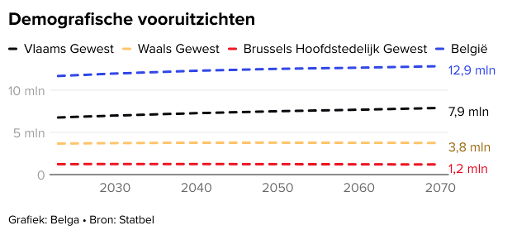Planning Bureau predicts decrease of population rate in Brussels and Wallonia

Brussels and Wallonia will face shrinking populations in upcoming decades while the Flemish population will continue to grow, the Federal Planning Bureau predicts in a new study.
In 2030, Brussels will see smaller population growth, a trend that will likely affect Wallonia in 2024. Between 2023 and 2070, the Planning Bureau expects the Flemish population to grow by 17 per cent. In Wallonia it would be by only 2 per cent and in Brussels there would be a 4 per cent decrease over that period. 2070 would see an increase in population from 11.7 million to 12.9 million peopel in Belgium.
In the coming years, the Planning Bureau expects migration to continue to be the main driver of population growth. From 2040 onwards, the population is expected to grow exclusively through migration.

The Planning Bureau assumes that migration will stabilise at around 160,000 immigrants per year in the coming years. The immigration flow from non-EU countries is increasing, but it is decreasing from the newest EU member states. Emigration is expected to stabilise at around 130,000 people per year, according to the Planning Bureau.
The natural balance of number of births and deaths will become negative from 2040. According to an updated methodology, the fertility rate will slightly increase. In 2022, there were an average of 1.5 children per woman. By 2035, that number is expected to rise to 1.6. This is still significantly lower than the level of the late 2000s when there were 1.9 children per woman.
© PHOTO FRANCOIS WALSCHAERTS / AFP
Related news

